

Psychopathology. Ethical Principles of Guidance and Counselling. Ethics mean moral principles that control or influence a person’s behaviour a philosophical discipline that is concerned with human conduct and moral decision making.
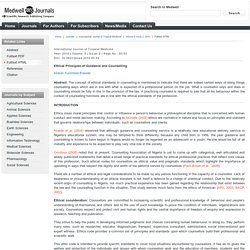
According to Akinade (2005) ethics are normative in nature and focus on principles and standard that governs relationships between individuals, such as counsellors and clients. Aluede et al. (2004) observed that although guidance and counselling service is a relatively new educational delivery service in Nigeria’s educational system, one may be tempted to think differently because any child born in 1959, the year guidance and counselling is known to have begun in Nigeria would no longer be regarded as an adolescent or a youth. He/she would be full of all maturity and experience to be expected to play very vital role in the society. There are a number of ethical and legal considerations to be made by any person functioning in the capacity of a counsellor. EBSCO Publishing Service Selection Page.
Untitled. Tools for metacognition. Metacognition is an important part of intentional learning, since it involves actively thinking about what you know, what you don’t know, and how you can get better at knowing and applying what you know.

A mantra for metacognition State the learning problem with some specificity: identify what you want to know and what you want to do with that knowledgeChoose strategies to solve the learning problem—draw upon your own prior knowledge and the knowledge of othersObserve how you used the strategies—keep a learning journal or blogEvaluate the results: What worked? What didn’t work? Rinse and repeat: Apply successful strategies to new learning problems. Thomas Szasz: The Right to Take Drugs.
Sandrine Thuret: You can grow new brain cells. Here's how. Psychology. Teen brain. Four neuromyths that are still prevalent in schools – debunked. It is no surprise that many teachers have an interest in neuroscience and psychology since areas such as memory, motivation, curiosity, intelligence and determination are highly important in education.
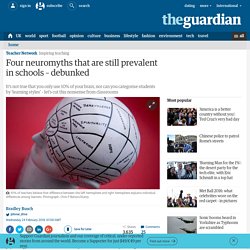
Www.tompkinscountyny.gov. BBC Radio 2 - Jeremy Vine, "My wife at the time was told: he needs electric s... Psychology A2: The Complete Companion - Mike Cardwell, Cara Flanagan. Are you to blame for your child's mental health issues? Addiction is not a disease: A neuroscientist argues that it’s time to change ... The mystery of addiction — what it is, what causes it and how to end it — threads through most of our lives.
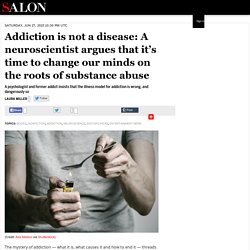
Experts estimate that one in 10 Americans is dependent on alcohol and other drugs, and if we concede that behaviors like gambling, overeating and playing video games can be addictive in similar ways, it’s likely that everyone has a relative or friend who’s hooked on some form of fun to a destructive degree. But what exactly is wrong with them? For several decades now, it’s been a commonplace to say that addicts have a disease. However, the very same scientists who once seemed to back up that claim have begun tearing it down. Once, addictions were viewed as failures of character and morals, and society responded to drunks and junkies with shaming, scolding and calls for more “will power.” Much of the potency of AA comes from its acknowledgement that willpower isn’t enough to beat this devil and that blame, rather than whipping the blamed person into shape, is counterproductive. A Lesson About Happiness From A Holocaust Survivor. Shutterstock "It is the very pursuit of happiness that thwarts happiness.

" In September 1942, Viktor Frankl, a prominent Jewish psychiatrist and neurologist in Vienna, was arrested and transported to a Nazi concentration camp with his wife and parents. Three years later, when his camp was liberated, most of his family, including his pregnant wife, had perished -- but he, prisoner number 119104, had lived. In his bestselling 1946 book, Man's Search for Meaning, which he wrote in nine days about his experiences in the camps, Frankl concluded that the difference between those who had lived and those who had died came down to one thing: Meaning, an insight he came to early in life. When he was a high school student, one of his science teachers declared to the class, "Life is nothing more than a combustion process, a process of oxidation.
" As he saw in the camps, those who found meaning even in the most horrendous circumstances were far more resilient to suffering than those who did not. Oliver James. Mental illness mostly caused by life events not genetics, argue psychologists. “And yet it detracts from the fact that when unemployment rates go up in a particular locality you get a measurable number of suicides.

“It detracts from the idea that trauma in childhood is a very very powerful predictor of serious problems like experiencing psychotic events in adult life, so of course the brain is involved and of course genes are involved, but not very much, and an excessive focus on those issues takes us away from these very important social factors” Unemployment and childhood trauma are to blame for many mental disorders Photo: Alamy Almost half of adults will suffer from a mental health condition at some stage in their life and more than a third of GP surgery consultations are due to mental problems.
One in four people have been diagnosed with some type of mental health problem - most commonly depression. Mind the Bump - Mindfulness and how the brain works. TEDxSunsetPark - Diana Winston - The Practice of Mindfulness. Ruby Wax on Mindfulness. Why Aren't We Teaching You Mindfulness. DrugFacts: Treatment Approaches for Drug Addiction. NOTE: This fact sheet discusses research findings on effective treatment approaches for drug abuse and addiction.
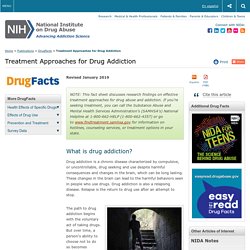
If you’re seeking treatment, you can call the Substance Abuse and Mental Health Services Administration's (SAMHSA's) National Helpline at 1-800-662-HELP (1-800-662-4357) or go to www.findtreatment.samhsa.gov for information on hotlines, counseling services, or treatment options in your state. Ten Takeaway Tips for Teaching Critical Thinking. Suggestions from educators at KIPP King Collegiate High School on how to help develop and assess critical-thinking skills in your students.
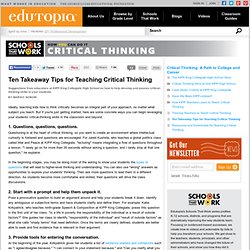
Ideally, teaching kids how to think critically becomes an integral part of your approach, no matter what subject you teach. But if you're just getting started, here are some concrete ways you can begin leveraging your students' critical-thinking skills in the classroom and beyond. 1. Questions, questions, questions. Questioning is at the heart of critical thinking, so you want to create an environment where intellectual curiosity is fostered and questions are encouraged. In the beginning stages, you may be doing most of the asking to show your students the types of questions that will lead to higher-level thinking and understanding. 2.